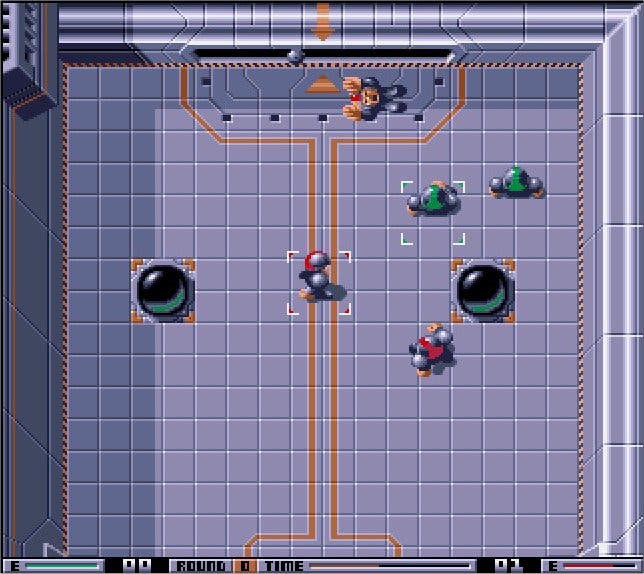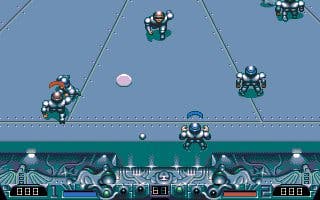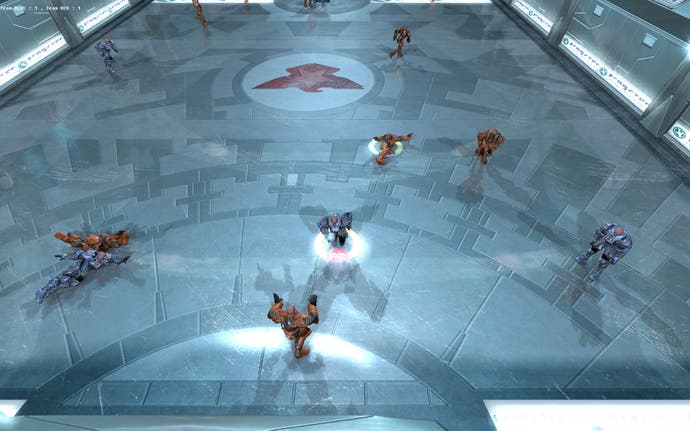Speedball 2
Mike Montgomery speaks about the beautiful game (in the future).
Between frenetic bouts of Speedball 2, as related in our earlier feature, we had a chance to chat to Mike Montgomery of the Bitmaps and discuss the long history of Brutal Deluxe's legacy.
Of course, to actually properly do that, you have to step back even further. As the "2" suggests, Speedball 2: Brutal Deluxe was a sequel. The Bitmap Brother's formed in 1987, making Xenon for the Amiga the following year. Its next project was... well, it wasn't going to be Speedball. "We were asked to do a game based on real tennis," Mike explains before stopping to clearly explain what the hell Real Tennis is. "It's not the tennis that we know. It's played in a court with surrounds and I'm not sure if it goes ALL the way around but... it's basically a cross between Tennis and Squash. You can make it go around the corners along the top. There's a court at Hampton Court, and Prince Charles does it a lot."
"We did a whole design on this, and went to the publisher. And the publisher said, "We changed our mind"," Mike sighs. "The first time, in the entire history of the Bitmap brothers, a publisher changed their mind - which happened all the way through our careers. Very despondently, the three partners walked to the pub and decided to drown our sorrows. Then we thought - we've done so much research into this, let's do a futuristic game based on the design we had for Real Tennis."
Clearly, this involved returning to the office and constructing an early version to demonstrate key features and... actually, no. "We didn't have any paper, so we got a cigarette box," Mike recalls, "Ripped it open. Wrote the design on the back. We then took it to a publisher - Mirrorsoft - and they went, 'This is new - this is something different. We'll publish it.' There and then. Signed up on the same day." We have to ask Mike if he seriously sold the game scribbled on the back of a cigarette box. He thinks about it for a few seconds. "We probably, to be fair, wrote a piece of paper to go with the cigarette box."

"It was great for Mirrorsoft to take a chance," Mike continues. "It was different. The idea of the game was to be arcadey, to be fast and to be fun. We went away and did it, and because we were on timescales, we didn't have time to put into the game what you want to put into it. I think the only thing we had were balls and bounce-domes, if I remember rightly. Speedball 2 came from the original Speedball, containing everything we couldn't put into it. The multipliers, the stars."
"We wanted to make the game very simplistic to play," Mike says, analysing its key appeal. "You can score points from the domes or the stars or whatever, but there weren't any rules as such. It wasn't like a football game, with corners and offsides. If it bounces off the side, you just catch it. The AI was quite simple - if you threw a ball and it went off the screen, there was usually a player there to grab hold of it. When you're continually playing the game, you don't get to stop and think about it. We made it ninety seconds a side because we wanted that fast, furious experience. We discovered that making it MORE than 90 seconds was a bit too much. Your wrists started hurting. You got blisters."
"It came into its own as a two-player game," Mike notes. "The single-player with the leagues and the knock-out was good, but it was a two-player game. It's the shame we didn't have the technology for the Internet then, as it probably would have been bigger than it was. It was a game where you went down the pub, get drunk, get a few pizzas, go back with your mates and play to the early hours of the morning. It's only 90 seconds... but you could spend all night playing it."
Released, it was enormously successful, possibly to the detriment of the Bitmaps' other games at the time (the isometric adventure Cadaver came just before it, the side-on adult-styled platform shooter Gods a few months after). "Some of the other games got overshadowed by Speedball 2 at the time," Mike considers. "It's a sports game, and a lot of people want to play a sports game... but not an actual sport. There's too many rules in those type of games to even understand. I mean, who understands the offside rule in football? I go to football every week, and I don't understand it myself."
Since then, the Speedball lineage has been fitful. The only game to be released was the PlayStation version, Speedball 2100 for Empire back in 2000. "Speedball 2100 was only meant to be a port of Speedball 2 in 3D," Mike remembers. "Personally, I thought the game played really well. It had 360 degree movement, which may have have even been an actual problem. We did have a problem with the goalies. Maybe the artwork wasn't up to the same Bitmap standard at the time... but it was relatively low budget. It sold really big numbers in North America. In [the UK]... not so much. The idea was to get another version of Speedball 2 into the world, so we could use the licence later when the online technology was better, and keep the name in use so there wasn't such a long gap between the last ones and the new ones." Versions for handhelds filled a similar niche.

But the real push would be the third 'proper' Speedball, Speedball Arena. "That was an interesting one," Mike says of the prototype that never found a home. "I think we did it a bit too early. I don't think the online market was big enough. We spoke to a number of publishers about it, and they looked at it as a risk, as it wasn't a first-person shooter. It was quite hard to sell. We did a bit of work on it, got it running in the Unreal engine... but the biggest selling point we tried to push was being able to control every player on both sides. That's a difficult thing to do. I don't think there's a football game that's tried that."
The problem with a game like that? "Everybody wants to score goals. Nobody wants to be a goalie. Nobody wants to be a [defender]. It just becomes capture the flag, and I don't think it'll work. Same as in football games. Unless you bring rules where you can't leave a zone... you get people getting frustrated. If your forwards are better than theirs, you just spend the entire game doing nothing."
Which leads to the new version, which could be a stepping stone to a world where you could create the infrastructure which will lead to that sort of play online. "The thing with this Speedball 2 with the online content, is that I think it'll be a clan-building [type of game]. There will be a lot of international teams or clans. So, once we get that era, I think Speedball 3 or Speedball Arena would be easier to sell to a publisher."
Which leads to the key question: why is now the right time for another Speedball game? "There are revivals of older games now. I think people are getting fed up of playing FPS all the time now. People are going back to old games which play really well. Especially with the Xbox Live Arcade, almost bringing back arcade games. Some of the gameplay in them is fantastic, even if they're twenty or thirty years-old."

The story of this project started with Frogster, the publisher, approaching Mike. "Being cautious and protective about the IP, I came to meet them," Mike recalls. "It was their enthusiasm which swung me over. They said they had a developer with a similar sort of philosophy to them in terms of what the game should be. The enthusiasm was just tremendous. The best thing about it was that they didn't want to change it too much - over the years a lot of people have tried to copy Speedball 2, and failed miserably. And it's because they've tried to make it too complex, to make it different... while trying to be the same sort of game. There's quite a few of them who just didn't manage it."
There's a secret about Brutal Deluxe. It felt brutal, but it really didn't show anything. Like the later Sensible Soccer, it left room for the player's imagination in favour of smooth play. "You actually haven't got time to take someone's arms or legs off," Mike argues. "It's a game. It's not about stopping and starting. The only time Speedball stops the game playing is if the little robot comes on and takes it off. But that's done with a little bit of humour - a little thing, trundling off. If there's too many people dying, it just stops play."
Play never stopping. Not even to drag your mate around to your house. "The advantage of this one is that you don't have to be in the same house. You can play anyone in the world. It just opens up a whole new ball game. And that's why the time is right for Speedball - because of the Internet and how big it's got over the years. Some of the technology we can use to make the game in 3D... almost makes it real."
Speedball 2 is coming to the PC from Frogster Interactive in the third quarter of this year.


